Quarterly Highlights from the Humanities and Social Sciences Communities
Published in Social Sciences, Behavioural Sciences & Psychology, and Philosophy & Religion

During the second quarter of 2025, a range of blog posts from the Humanities and Social Sciences Communities attracted high readership. These stories span from exploring why climate change feels distant, to uncovering hidden routes of illegal wildlife trade, to building cultural indicators rooted in local context, and highlighting the voices of LGBTQIA+ researchers. What ties them together is their focus on connecting research to the real-world challenges we all face.
Making Climate Change Visible 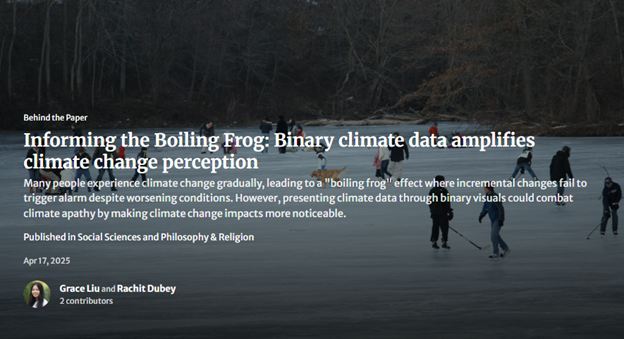
Why don’t we feel alarmed by climate change, even as the evidence keeps piling up? This study explores the “boiling frog” effect – how we gradually get used to change and fail to notice the crisis building around us.
Published in Nature Human Behaviour, researchers @Grace Liu and @Rachit Dubey show that presenting climate data in binary terms (like “lake frozen / not frozen”) makes climate impacts feel more immediate and noticeable than traditional continuous temperature graphs, which affects how seriously we take the issue and whether we act.
Read the blog post to discover how a simple shift in data design could help bring the crisis into sharper focus.
How Does Data Science Helps Fight Wildlife Smuggling? 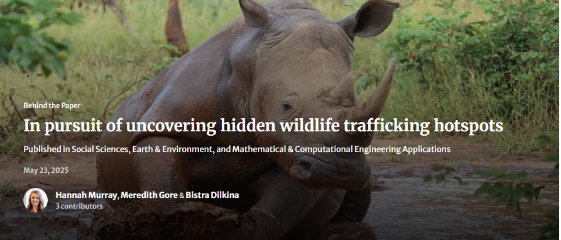
Illegal wildlife trafficking often remains hidden, and relying only on reported seizures of smuggled animals and products provides an incomplete picture.
In a study published in Communications Earth & Environment, researchers @Hannah Murray, @Meredith Gore, and @Bistra Dilkina combined large open datasets and used machine learning to predict hidden trafficking hotspots in global flight networks. Their findings show that airports with high connectivity and in regions with weak governance or other environmental crimes are more likely to be involved in wildlife smuggling. Most strikingly, the model identified several likely hotspots even without any such recorded incidents – and later news confirmed links to trafficking.
Read more to see how data science helps protect wildlife from crime.
Measuring Culture in Abu Dhabi – Can Numbers Show What Makes It Unique? 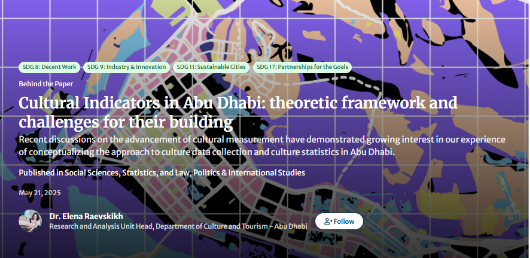
Abu Dhabi is building cultural indicators to capture its unique heritage and support its cultural life while remaining meaningful internationally.
In a study published in Quality & Quantity, author @Dr. Elena Raevskikh and colleagues propose a new approach: starting from local cultural vocabularies and documents to create cultural indicators rooted in Abu Dhabi’s context, yet comparable with global frameworks like UNESCO’s Culture 2030 Indicators.
Read the blog post to see how Abu Dhabi is pioneering this locally grounded yet globally relevant approach.
June was Pride Month, so I’m highlighting two popular News & Opinions pieces from Q2 that explore identity, visibility, and advocacy within the research community. For more Pride-related content, you can also check out June Highlights from the Medicine and Life Sciences Research Communities.
Intersecting Identities, Shared Struggles 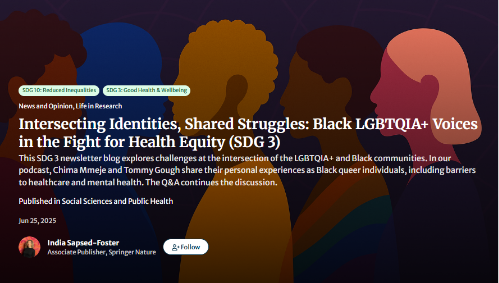
What happens when race and queer identity intersect? In @India Sapsed-Foster’s blog, advocates Chima Mmeje and Tommy Gough share their journeys as Black and LGBTQIA+ individuals facing layers of discrimination from family support, religious rejection to systemic bias in healthcare. For Black queer individuals, this often means facing double discrimination: homophobia within Black communities and racism within LGBTQIA+ spaces. However, they also highlight signs of change – younger generations pushing for acceptance, and the power of authentic representation in media.
Read the full blog or listen to the podcast to learn how visibility, self-acceptance and storytelling empower Black LGBTQIA+ communities to claim space, advocate for inclusive care and support mental health.
Supporting Trans and Nonbinary Scientists 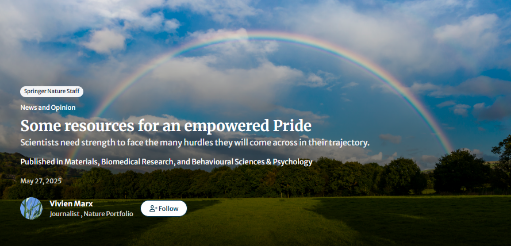
Scientists often face challenges, but for transgender and nonbinary scientists, these can be especially personal and steep.
In this blog, journalist @Vivien Marx talks with scientists Dr. Megan Povey and Dr. Winston Hirschler Dredge about transitioning in academia and the freedom that comes from embracing one’s true self.
The blog also highlights helpful resources like research papers, podcasts, interviews, books and guides on mental health, legal support and inclusive hiring advice. These resources highlight systemic gaps and offer actionable ways institutions and allies can help, from improving name change policies in publications to making fieldwork safer and workplaces more inclusive.
Read the blog to see how visibility, support, and institutional change can help trans and nonbinary scientists thrive – and why this strengthens science for everyone.
These blogs offer just a glimpse of how humanities and social sciences research sheds light on some complex questions about our world. Curious to dive deeper? Explore more stories in the Behind the Paper and Life in Reseach channels, where researchers share their journeys and inspirations. Don’t forget to browse other quarterly highlights across our Communities:
Lastly, we have just launched a dedicated space for early career researchers – the ECR Hub. If you are an early career researcher looking for support, advice, to expand your network and learn about others’ experiences in research, visit the Hub and make sure to follow it to stay in the loop!
We’d love to hear from you! Like, comment, or share posts that resonate with you. Your voice helps spark meaningful conversations and connects a global community of researchers.
Follow the Topic
-
Nature Communications

An open access, multidisciplinary journal dedicated to publishing high-quality research in all areas of the biological, health, physical, chemical and Earth sciences.
-
Quality & Quantity

This journal constitutes a point of reference for European and non-European scholars to discuss instruments of methodology for more rigorous scientific results in the social sciences.
-
Nature Human Behaviour

Drawing from a broad spectrum of social, biological, health, and physical science disciplines, this journal publishes research of outstanding significance into any aspect of individual or collective human behaviour.
Related Collections
With Collections, you can get published faster and increase your visibility.
Women's Health
Publishing Model: Hybrid
Deadline: Ongoing
Advances in neurodegenerative diseases
Publishing Model: Hybrid
Deadline: Mar 24, 2026





Please sign in or register for FREE
If you are a registered user on Research Communities by Springer Nature, please sign in
Whee such a nice compilation and thank you!